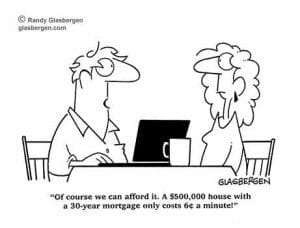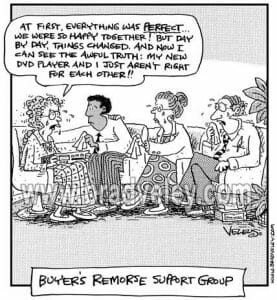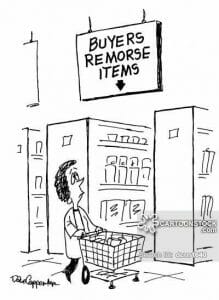Written By: Lisa Philios, AFC®
What if I asked every reader to name one thing they regret spending their money on. How many could answer this question? Just about everyone.
Buyer’s remorse (or buyer’s regret) defined is “the sense of regret after having made a purchase. Factors that affect buyer’s remorse include resources invested, the involvement of the purchaser, whether the purchase is compatible with the purchaser’s goals, and what positive or negative evidence the purchaser encounters post-purchase that confirms whether or not the purchase was a good idea.”
Surveys conducted by Credit Donkey and Trulia reveal more than 50% of respondents often or sometimes feel guilty about purchases and regret their current home purchase, respectively. Why? Simply put, the specific purchase is no longer aligned with one’s values, budget, mood, lifestyle, plan and so forth. Buyer’s remorse can and may be detrimental to a person’s financial well-being and it begins with overspending.
The Psychology behind Spending

Why do we spend? Two reasons – to fulfill a need or satisfy a want. For some, spending is a feel-good moment to help relax, perk up a mood or ease pain away.
Then why do we overspend? There are many reasons:
- Impulse Shopping. Caught in the moment, shopping on a whim, believing the purchase will add some sort of value to your life.
- Store Advertising Tactics. Stores capture the consumer by creating a pleasing shopping environment (playing music playing, free samples, etc).
- Keeping Up With the Joneses. If we choose to fit in with the crowd by over-exhausting our financial resources, we will lose. However, many still try to keep up with their peers.
- Denial/Poor Spending Habits. Denial that there is a problem and lack of a budget lead to overspending.
- Retail Therapy. It’s not what the doctor ordered; however, many use retail therapy to improve their current state of mind.
- It Was On Sale. We can go broke trying to save money. If the purchase need is truly absent, buying because it was on sale may not be ideal.
When we exhaust our wealth, debt builds up, relationships fall apart, depression surfaces and regret hits. The cycle of overspending can be hard to break.
The Psychology behind Regret

Why does regret from spending occur?
- The purchase is not in-line with one’s values
- The purchase was made on impulse
- The purchase is no longer needed
- The purchase exhausts our wealth
Professor Neal Roese of the Kellogg School of Management at Northwestern University is a globally recognized expert in the psychology of judgment and decision-making. He is recognized as a leading expert on hindsight bias, counterfactual thinking and the emotion of regret. His studies of younger people have shown that regret was rated more favorably than unfavorably, primarily because of its informational value in motivating corrective action. Interestingly, regret was rated highest of a list of negative emotions in fulfilling five functions: making sense of the world, avoiding future negative behaviors, gaining insight, achieving social harmony and improving ability to approach desired opportunities (presumably because we regret past passivity).
And according to Professor Roese’s studies, regret can be a powerful tool to change one’s financial well-being.
Use Buyer’s Remorse to Change your Life

Buyer’s Remorse is a powerful emotion. Many can successfully utilize remorse to alter their spending habits and gain a sense of realization. The following are ways we can help ourselves and our clients overcome buyer’s remorse:
- Return Item(s). Return the item immediately after regret sets in.
- Forgive Yourself. Avoid feeling defeat. Instead, use your newfound wisdom to learn from the spending mistake.
- Use Remorse as Motivation. Remorse can help realization and with realization comes motivation. Motivation can lead to successful spending habits – one can be motivated to save more and spend less.
- Be Happy with what you Own. One way to avoid unnecessary spending is to be content with what you currently own. Use what you have until it needs replacing. Take care of what you own to slow down the wear and tear.
- Wait. Avoid impulse shopping. Wait a day or more prior to making your decision.
In conclusion, regret from spending is a normal emotion with the potential to propel us to change our current and future financial behavior.
Resources are a Click Away
- Buyer’s Remorse articles: http://www.healthguidance.org/entry/17800/1/The-Psychology-Behind-Buyers-Remorse.html and http://balancetrack.org/psychology/index.html
- Federal Trade Commission’s Buyer’s Remorse Law and Cooling Off Rule: https://www.consumer.ftc.gov/articles/0176-buyers-remorse-when-ftcs-cooling-rule-may-help
- Federal Trade Commission’s Complaint assistant (If you believe a Seller violated the FTCs Cooling-Off Rule): https://www.ftccomplaintassistant.gov/
- FINRAs Savings Calculator: https://tools.finra.org/savings_calculator/